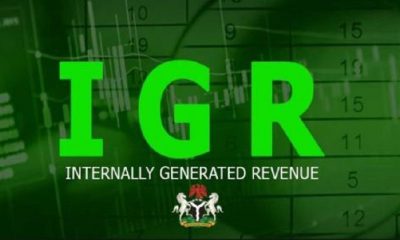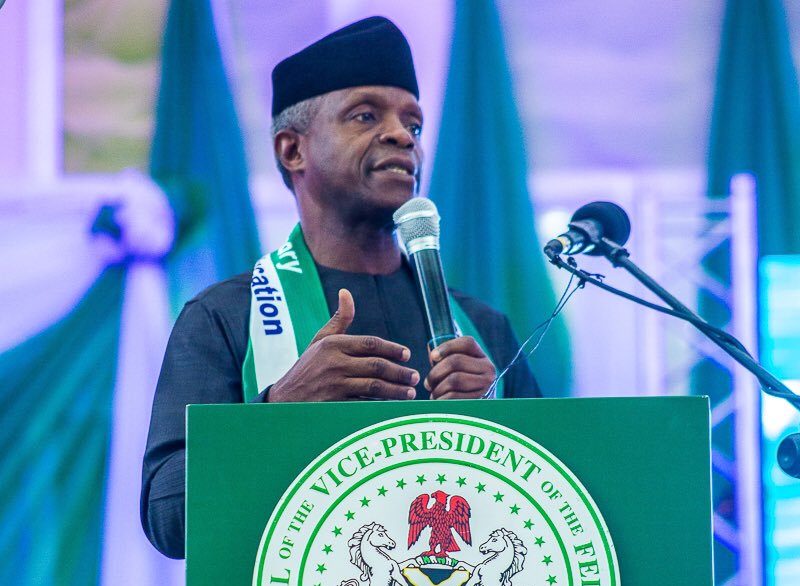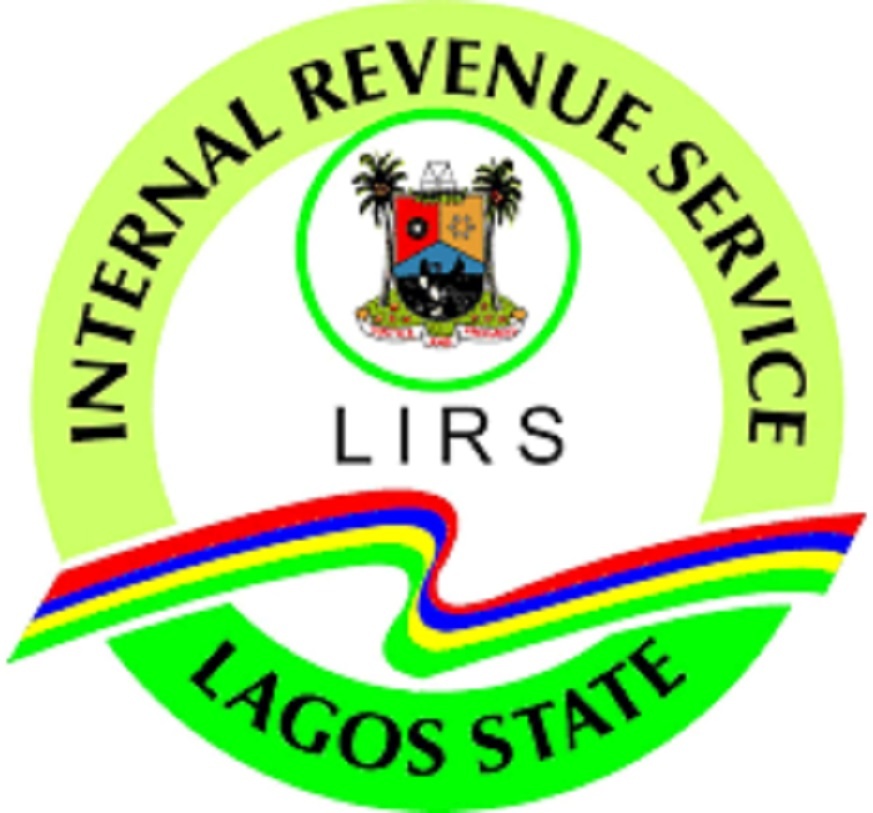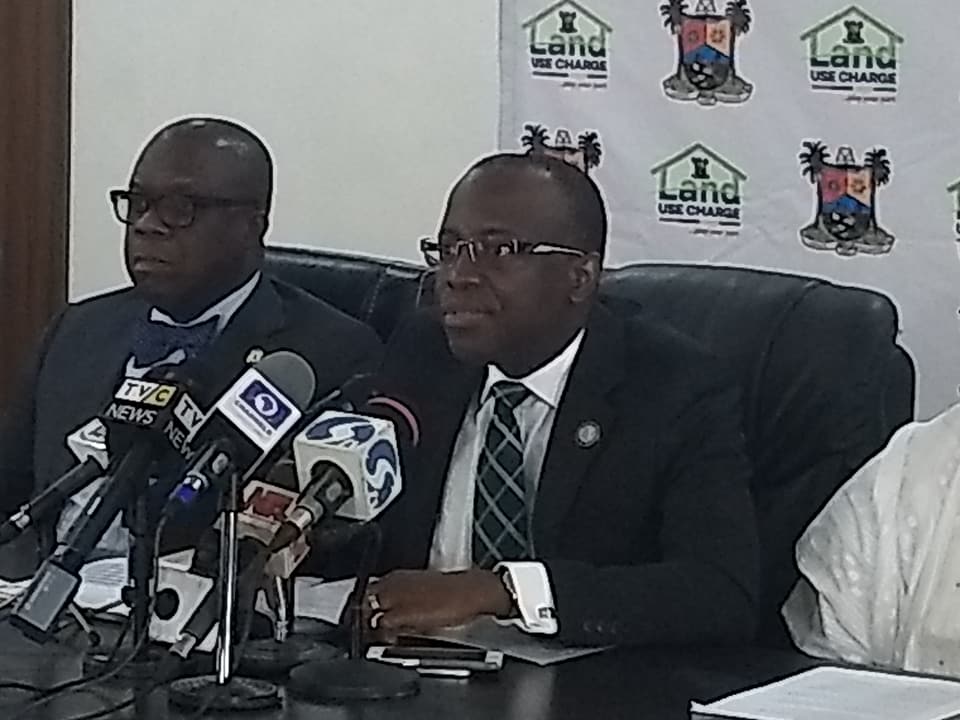Economy
Lagos Generates More IGR than 30 States Combined—Report
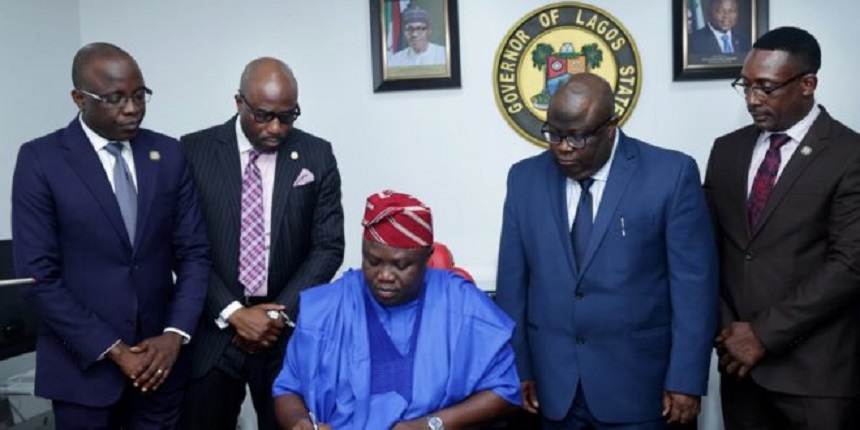
By Dipo Olowookere
A new report released by Economic Confidential has revealed that Lagos State generates more Internally Generated Revenue (IGR) than 30 of the 36 states in the federation combined.
The report by this economic intelligence magazine indicates that the IGR of Lagos State of N333 billion is higher than that of 30 States put together whose IGR are extremely low and poor compared to their allocations from the Federation Account.
The states with impressive over 30 percent IGR apart from Lagos are Ogun, Rivers, Edo, Kwara, Enugu and Kano States who generated N607 billion in total, while the remaining states merely generated a total of N327 billion in 2017.
In its Annual States Viability Index (ASVI), the reputable journal also said only 17 states are insolvent as their IGRs in 2017 were far below 10 percent of their receipts from the Federation Account Allocations (FAA) in the same year.
The index, carefully and painstakingly computed, proved that without the monthly disbursement from the Federation Account Allocation Committee (FAAC), many states remain unviable, and cannot survive without the federally collected revenue, mostly from the oil sector.
The IGR are generated by states through Pay-As-You-Earn Tax (PAYE), Direct Assessment, Road Taxes and revenues from Ministries, Departments and Agencies (MDAs).
Recently, the magazine published the total allocations received by each state in Nigeria from FAA from January to December 2017.
The latest report on IGR revealed that only Lagos and Ogun States generated more revenue than their allocations from the Federation Account by 165 percent and 107 percent respectively and no any other state has up to 100 percent of IGR to the federal largesse.
The IGR of the 36 states of the federation totalled N931 billion in 2017 as compared to N801.95 billion in 2016, an increase of N130 billion.
While the report provides shocking discoveries, the states with less than 10 percent IGR have jumped to 17 from 14 states in the previous year 2016.
The poor states may not stay afloat outside FAA due to socio-political crises including insurgency, militancy, armed-banditry and herdsmen attacks. Other states lack foresight in revenue generation drive coupled with arm-chair governance.
The states that may not survive without the Federation Account due to poor internal revenue generation are Bauchi which realized a meagre N4.3 billion compared with a total of N85 billion it received from FAA in 2017 representing about 5 percent; Yobe with IGR of N3.59 billion compared with FAA of N67 billion representing 5.33 percent; Borno N4.9 billion compared with FAA of N92 billion representing 5.41 percent; Kebbi with IGR of N4.39 billion compared with N76 billion of FAA representing 5.77 percent and Katsina with IGR of N6bn compared to N103 billion of FAA representing 5.8 percent within the period under review.
Other poor internal revenue earners are Niger which generated N6.5 billion compared to FAA of N87 billion representing 7.43 percent; Jigawa N6.6 billion compared to FAA of N85 billion representing 7.75 percent; Imo N6.8 billion compared with FAA of N85 billion representing 8.1 percent and Akwa Ibom N15 billion compared with FAA of N197 billion representing 8.06 percent, Ekiti N4.9 billion compared with FAA of N59 billion representing 8.38 percent; Osun N6.4 billion compared with FAA of N76 billion representing 8.45 percent, Adamawa N6.2 billion compared with FAA of N72.9 billion representing 8.49 percent, Taraba N5.7 billion compared with FAA of N66 billion representing 8.70 percent and Ebonyi N5.1 billion compared with FAA of N57.8 billion representing 8 percent.
Meanwhile, Lagos State remained steadfast in its number one position in IGR with a total revenue generation of N333 billion compared with FAA of N201 billion which translates to 165 percent in the 12 months of 2017.
It was followed by Ogun State which generated IGR of N74.83 billion compared with FAA of N69 billion representing 107 percent.
Others with impressive IGR include Rivers with N89 billion compared with FAA of N178 billion representing 50 percent; Edo with IGR of N25 billion compared with FAA of N75 billion representing 33 percent. Kwara State however with a low receipt from the Federation Account has greatly improved in its IGR of N19 billion compared with FAA of N61 billion representing 32 percent while Enugu with IGR of N22 billion compared with FAA of N69 billion representing 32 percent.
Kano generated N42 billion compared with FAA of N143 billion representing 30 percent while Delta State earned N51 billion IGR against FAA of N175 billion representing 29 percent.
The Economic Confidential ASVI further showed that only three states in the entire Northern region have IGR above 20 percent. They are Kwara, Kano, and Kaduna States.
Meanwhile, 10 states in the South recorded over 20 percent IGR in 2017. They are Lagos, Ogun, Rivers, Edo, Enugu, Delta, Cross River, Anambra, Oyo and Abia States.
The states with the poorest IGR of less than 10 percent in the South are Bayelsa, Ebonyi, Osun, Ekiti, Akwa-Ibom and Imo States while in the North; Gombe, Zamfara, Taraba, Adamawa, Jigawa, Niger, Katsina, Kebbi, Borno, Yobe and Bauchi States.
Meanwhile, the IGR of the respective states can improve through aggressive diversification of the economy to productive sectors rather than relying on the monthly Federation Account revenues that largely come from the oil sector.
Economy
Uzoka-Anite Warns Against Inflation Risks from Oil, Gas Earnings Surge

By Adedapo Adesanya
The Minister of State for Finance and chairman of the Federation Account Allocation Committee (FAAC), Mrs Doris Uzoka-Anite, has cautioned that a projected surge in oil and gas revenues following President Bola Tinubu’s latest executive order could trigger inflationary pressures and exchange rate volatility if not carefully managed.
She said that the recent executive order mandating the direct remittance of certain oil sector revenues to the federation account would provide regulatory clarity and significantly strengthen revenues accruing to the federation account, but warned that sudden liquidity injections into the economy may complicate monetary policy coordination with the Central Bank of Nigeria and erode the real value of allocations to federal, state and local governments.
While addressing members of FAAC in Abuja, Mrs Uzoka-Anite commended President Tinubu on the order, describing the development as a structural fiscal correction aimed at restoring constitutional discipline to petroleum revenue management and enhancing distributable income across the three tiers of government.
She said that the revenue outlook was improving due to ongoing structural reforms introduced by the Federal Government.
According to her, the newly implemented tax reform measures are broadening the tax base, improving compliance and enhancing administrative efficiency.
“Also, the executive order signed by Mr President on February 13 is reinforcing revenue discipline in the oil and gas sector and reducing leakages,” she said.
The minister said that the order suspends the 30 per cent allocation to the Frontier Exploration Fund (FEF) and suspends the 30 per cent management fee on oil and gas profit payable to NNPC Limited.
She said that the order also directed that gas flare penalties be paid into the federation account, and mandated full remittance of petroleum revenues without unconstitutional deductions.
Mrs Uzoka-Anite said that the reform marks a shift from a retention-based oil revenue model to a gross remittance, federation-first model.
“The implications for FAAC are very significant; more oil and gas profit will now flow directly into the federation account.
“Gas flare penalties will become distributable revenue, and previously retained management fees will no longer reduce remittable inflows,” she said.
She said that the reforms were expected to result in higher monthly gross inflows into the federation account, and increased allocations to federal, state and local governments.
The minister said that a retrospective audit of the FFF, the Midstream and Downstream Gas Infrastructure, was due, and NNPC management fee deductions could lead to recoveries that may provide a one-off fiscal boost.
She welcomed the improved revenue outlook and cautioned against the risks associated with sudden liquidity injections.
“Experience shows that when revenues rise sharply and are distributed fully and immediately, large liquidity injections can increase inflationary pressures, complicate monetary management and reduce the real purchasing power of allocations,” she said.
She said that excess aggregate demand, exchange rate pressure, asset price distortions and inflationary risks could arise if increased inflows were not carefully managed.
Mrs Uzoka-Anite said that to mitigate such risks, she proposed phased disbursement of one-off recoveries.
She suggested that retrospective recoveries be staggered rather than injected into the economy in bulk, with a portion temporarily warehoused in a stabilisation buffer.
She also recommended strengthening the excess crude and stabilisation buffer mechanism to channel part of incremental inflows into a fiscal stabilisation window.
“This could offset revenue shortfalls in weaker months and reduce procyclicality in spending.
According to her, enhanced coordination with the CBN would be pursued to align fiscal injections with liquidity management tools and support open market operations where necessary.
Mrs Uzoka-Anite urged states and federal Ministries, Departments and Agencies (MDAs) to prioritise capital expenditure over recurrent expenditure.
She called for investment in infrastructure, agriculture, energy and other productive sectors, and avoid unsustainable wage or consumption spikes.
“Productive spending expands supply capacity and mitigates inflation,” she said.
She also announced plans to introduce monthly revenue transparency dashboards, production-to-remittance reconciliation reporting, and clear reporting of incremental inflows arising from tax reforms and the executive order.
The junior finance minister said that the reforms presented an opportunity to deepen fiscal federalism, enhance distributable revenue, restore constitutional clarity and strengthen trust among tiers of government.
She also advised that increased revenue must not translate into fiscal complacency.
“We must resist the temptation to treat incremental inflows as permanent windfalls. We should reduce debt burdens, clear arrears responsibly, build buffers and invest in growth-enhancing sectors,” she said.
Economy
Dangote Refinery Shares to be Available to Public in Five Months

By Adedapo Adesanya
The chairman of Dangote Group, Mr Aliko Dangote, has said that within the next five months, Nigerians should be able to purchase shares of Dangote Petroleum and Refinery.
Mr Dangote made this revelation on Sunday during a tour of the facility by the chief executive of the Nigerian National Petroleum Company (NNPC) Limited, Mr Bayo Ojulari, alongside members of the company’s executive management.
The $20 billion refinery is the largest single-train refinery in the world with 650,000 barrels per day refining capacity. There are efforts to boost the capacity to 1.4 million barrels per day soon.
Speaking with journalists, Mr Dangote said, “And the other issue is that they (NNPC) are holding 7.25 per cent of the shares that we have here, which is more than the shares Elon Musk has in Tesla. And they are holding that on behalf of Nigerians,” he said.
“So individually, Nigerians too will have an opportunity in the next, maybe a maximum of four to five months. There will actually be an opportunity to buy the shares.”
He added that shareholders will have the option to receive their dividends in either naira or dollars, as the refinery also earns in dollars.
Commenting on Mr Ojulari’s visit, the billionaire businessman said the NNPC, represented by Mr Ojulari and its management team, was not just a guest but a shareholder.
“Today is really our best day ever” at the facility. I know NNPC invested in us when we were not really sure whether the refinery would be successful.
“So that’s the kind of level of confidence. But right now, the relationship with the new set of people that we have at NNPC, I think the sky is the limit, and we will cooperate and also make sure that we work together to make sure that we make Nigerians proud.”
Speaking on prospects of partnership with NNPC in the upstream sector, he said, “We have block 71, 72, but we’re going to look much deeper”.
“Most likely, depending on our own discussions with them, we will partner with them, maybe in some of the upstream. They, too, will partner with us here because here is not just a refinery, it’s an industrial hub.
“And that’s why we’re doing linear alkaline benzene, which is a raw material for detergents, ” he added.
Economy
NGX Investigates Zichis Stocks After 859% Rise in One Month

By Aduragbemi Omiyale
The Nigerian Exchange (NGX) Limited has launched an investigation into trading activities on the shares of Zichis Agro-Allied Industries Plc.
A notice from Customs Street on Monday disclosed that this has led to the suspension of the company for now.
This development comes about a month after Zichis was listed on the domestic bourse and placed in the growth board of the NGX.
In the circular, it was disclosed that the suspension may be lifted after the conclusion of the findings, but for now, investors will not be able to trade the organisation’s securities on the NGX platform.
“The suspension of trading in Zichis shares shall be lifted upon the conclusion of an investigation into the trading activities on the company’s shares,” a part of the disclosure stated.
The bourse explained that it wielded the big stick on Zichis in compliance with Rule 7.0, Rules on Suspension of Trading in Listed Securities, Rulebook of The Exchange (Issuers’ Rules).
This part of the law states that, “Notwithstanding any of the foregoing provisions, the exchange may, in accordance with any of its rules, place the trading of any security on suspension.
“It may also do so if it is of the view that such suspension will be in the interest of the investing public and in accordance with the SEC Rules.”
In announcing the action on the firm, the NGX declared that, “The shares of Zichis Agro-Allied Industries Plc have been suspended from trading on the facilities of Nigerian Exchange Limited (NGX), effective today, Monday, February 23, 2026.”
Business Post reports that last week, shares of Zichis appreciated by 60.74 per cent to N17.36. It joined the stock exchange at N1.81, indicating it has gained N15.55 or 859.12 per cent in one month.
-

 Feature/OPED6 years ago
Feature/OPED6 years agoDavos was Different this year
-
Travel/Tourism10 years ago
Lagos Seals Western Lodge Hotel In Ikorodu
-

 Showbiz3 years ago
Showbiz3 years agoEstranged Lover Releases Videos of Empress Njamah Bathing
-

 Banking8 years ago
Banking8 years agoSort Codes of GTBank Branches in Nigeria
-

 Economy3 years ago
Economy3 years agoSubsidy Removal: CNG at N130 Per Litre Cheaper Than Petrol—IPMAN
-

 Banking3 years ago
Banking3 years agoSort Codes of UBA Branches in Nigeria
-

 Banking3 years ago
Banking3 years agoFirst Bank Announces Planned Downtime
-

 Sports3 years ago
Sports3 years agoHighest Paid Nigerian Footballer – How Much Do Nigerian Footballers Earn


